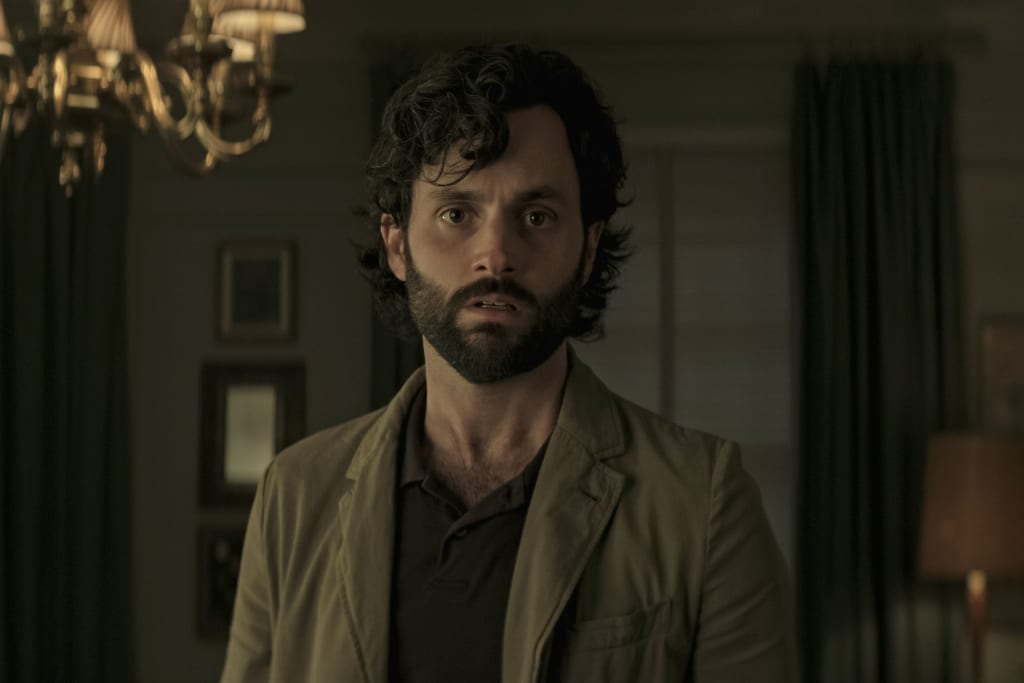YOU Season 4: A Satire of Satire
Class commentary and contradictions

Spoiler Warning!
Joe Goldberg, as much as he'd like to convince us that this isn't the case, lacks self awareness. Obviously. He is always telling us what a good guy he is, and how none of this was meant to happen, and that he's trying to change, but we know that people don't trip up and accidentally murder (nearly) all of their romantic partners, plus a few extra for good luck.
This kind of lack of self awareness is not what I want to explore now, though, because its blindingly obvious, and made all the more poignant with the Fight Club style twist in the second half of the season. In this article, I will investigate his contempt for his upper-class friends and his satirical commentary on them, which itself becomes satirised in the latter half of the season.
The season begins with us, as per usual, fully immersed in his internal monologue. And as he enters a world of ridiculous wealth and snobbery, while remaining a clear outsider, he is who we cling to and identify with. His commentary on them is inevitably mocking, and in my opinion felt a bit too on the nose. The satire created in the first half of the season was only done so through mocking overtly dislikeable upper-class characters, who often felt more like caricatures than characters in their own right. However, this made the characters feel inauthentic and exaggerated, as the only one who is given any kind of depth or positive characterisation is Lady Phoebe. The middle of the season sees some sympathy built for Kate, though through her endless whining, the admission that she was the one responsible for the companies scandal, and her return to her father's company, causes any of this sympathy to dissipate.
When the shock twist of Joe's split personality is revealed, we are reminded of the extent of his unreliability as a narrator. As a TV show, in previous seasons it has been easier to distinguish between Joe's biases and the truth, as the viewer can discern what is happening and ignore Joe's assertions that he is 'not a bad guy', compared to in a book, for example, where you often have to take the narrator's words more literally. This season, however, showed that the visual viewpoint we get can be misleading, too, and there's no reason to trust that. On a second inspection, therefore, I was inclined to scrutinise Joe's portrayal of his rich friends more closely.
He satirises him in a manner that is typical of mainstream media at the moment. That being, he more often criticises their vile personalities, rather than criticising their exploitation and wealth hoarding. Criticising the latter would be clearly more controversial than just pointing out that characters being mean is bad, and that these mean characters just happen to be wealthy. Many satires recently only criticise 'bad' billionaires, such as the Wolf of Wall Street arguably glamorising the wealth and focusing more criticism on the immoral means with which he got it, and subsequently the immoral way in which he treats those close to him, or Glass Onion criticising Miles Bron for stealing Andi's idea, with the assumption that Andi would have become a 'moral billionaire' had this not happened. This style of satire allows the viewers the satisfaction of mocking the wealthy, while Hollywood can remain in the status quo, mocking only bad billionaires, and not wealth hoarding in itself.
In the second half of the season, once the viewer is forced to take a step back from Joe and reconsider his reliability (or lack thereof) it becomes more obvious the real issue with his new group- their greed, not just their personalities. This is shown most prominently through Kate, who Joe becomes obsessed with and therefore forgets his contempt for the upper class. Although she initially shows remorse for her involvement in the company's scandal, her return to running the company and her surprising lack of shock about her father's hitman hiring tendencies serves to frame her as as bad as, if not worse than, the other members of the group.
His weak morals, which he perceives to be strong, are similarly shown when Kate's boyfriend, Malcom, spews endless misogynistic comments, and Joe clings to this for more justification for the murder. However, when Joe is listening to Malcom, the only point at which he reacts is when Marienne is insulted specifically, rather than women in general. This indicates that his issue was not with misogyny itself, rather with another man threatening her, as apparently only Joe is allowed to do that.
Rhys is the other prominent character with which Joe becomes obsessed, and he too symbolises the issue with Joe's critique of class. Rhys is framed as a hero of the working class, turning his life around and going to Oxford University, however he is only able to do this when he discovers he is the son of a Duke. This second chance, therefore, only comes from being born into the right family, limiting movement between economic groups. Rhys is not the hero of the working class that Joe believes him to be, he just somehow fits into Joe's twisted fantasy.
Overall, through seeing Joe's surface level critique of the upper class in the first half of the season, in which he focuses more on how they're mean to him rather than their wealth and excess, and then moving on to the second half of the season in which the viewer can more objectively see the flaws with which he has criticised them, You creates a satire of satire. The flaws of many modern satires are highlighted through this two halved approach, and the viewer is left to draw their own conclusions about whether Joe was focusing on criticising the right things, that being personality over politics.
About the Creator
Hannah Macdermott
the rantings and ramblings of an inconstant mind.






Comments
There are no comments for this story
Be the first to respond and start the conversation.